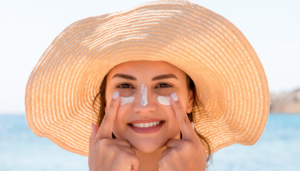Have you heard of natural sunscreen? As consumers become increasingly more aware of the effects chemical sunscreen has on their bodies, many are making the switch to natural sunscreen that is safer for them and their loved ones. Also known as mineral or physical sunscreens, this specific type of SPF has had a boost in popularity over the past few years for a number of reasons – from protecting marine life to protecting your skin, let’s look at why we’re making the case for natural sunscreen to have a permanent place in your family’s beach bag.

What makes natural sunscreen, well…natural?
As shared before, “natural sunscreen” refers to sunscreens that are either a) mineral filters and use zinc oxide and titanium dioxide, or b) have a ‘natural’ chemical filter. Here’s the distinct difference between those two types of sunscreen that we’re borrowing from our friends at Clearya – according to them:
- Chemical filters: Chemical filters are active sunscreen ingredients that absorb UV rays like a sponge. These protect against UVB rays, and some protect against UVA range.
- Mineral filters: Instead of being absorbed, mineral filters (zinc and titanium oxide) sit on top of the skin to act as a protective barrier against UVA and UVB rays.
While the FDA used to think that chemical filter natural sunscreens were safe, mineral filters are truly the only effective and safe way to protect against the skin given that chemical filters absorb into the body. Using a chemical filter natural sunscreen is not only less effective, but could have potentially harmful effects long term on human health. So, for the purposes of this article, let’s focus on natural sunscreens with a mineral filter lens.
Now that we’ve got that out of the way, let’s get back to our topic. When using a natural sunscreen that’s mineral-based, these ingredients form a protective barrier on top of the skin’s surface to repel UV rays away from the body. To take it a step further, fully “natural”, sunscreens must also be:
- Synthetic chemical-free
- Reef-safe
- Hypoallergenic’
Which, we’re sure, leads you to another question…
Are natural sunscreen products as effective as chemical sunscreens?
Absolutely. We touched on this a bit above but let’s cover it in more depth.
Some would argue that the use of synthetic materials in chemical sunscreen makes it less effective due to it seeping into the skin faster. Natural sunscreens sit on top of the skin’s barrier instead of seeping in right away, making them safer to use from an absorption perspective and arguably more effective at repelling the sun’s harmful rays.
So, in this case, natural doesn’t mean less effective by any means.
5 benefits of using natural sunscreen
We choose to go the natural sunscreen route because it’s:
1. Safer for you (immediately)
While chemical sunscreens can take up to 20 minutes to work, natural sunscreen has immediate effects as soon as you apply. This is especially helpful in high-UV climates where it’s almost impossible to be out of the sun completely, even when indoors.
Further, because natural sunscreens don’t contain synthetic materials and have a lower chance of skin absorption, they are less likely to cause allergic reactions and harm health over time.
2. Sensitive skin-friendly
On top of the safety benefits, natural sunscreens are gentler on skin than chemical sunscreens. The natural minerals create a physical barrier without being absorbed as quickly into the pores, allowing them to be used by a wider range of people with different skin needs. This is especially helpful for people with acne-prone skin who may find it difficult to find a sunscreen that works for them – enter: natural sunscreen!
3. Stable ingredients
While many people ignore the expiration date on sunscreen, you could avoid the whole issue by choosing natural sunscreen. Because the ingredients are derived from natural sources, natural sunscreens are shelf stable for longer, requiring no shock and awe when you get to the beach and your sunscreen says its expired.
4. Child and baby-friendly
Many chemical sunscreens are labeled as “baby-safe” or “child-safe” but it’s much less harmful to choose a product with natural ingredients. Natural sunscreen’s minerals will protect your child’s skin without the risk of harming them along the way.
5. Safer for the earth
By choosing ingredients that are coral reef and marine life-friendly, you’re making a conscious and concerted effort to do your part in fighting climate change. Help protect our under the sea friends by choosing ingredients that won’t harm them. Which leads us to…
What makes chemical sunscreens harmful to the planet?
We appreciate you asking this important question. Chemical sunscreens are harmful due to their ingredient makeup and the effect those materials have on marine life. The coral reef alliance notes that there is an estimated 14,000 tons of chemical sunscreen leaked into the ocean annually causing:
- Coral reef damage: Chemical sunscreen may cause coral bleaching and disrupt the coral’s reproductive processes. By doing so, this could directly affect the underwater ecosystem that exists, threatening the home of various marine species and contributing further to our climate crisis.
- Marine species harm: When looking at the health of marine life, we can’t ignore that introducing foreign chemicals can have negative effects on underwater species. This can lead to bioaccumulation, where chemicals build up in aquatic organisms over time, and endocrine disruption, which trickles up the food chain to larger marine species such as whales, dolphins, sharks, and more.
- Pollution: Chemical sunscreens can wash off into oceans and other bodies of water during swimming or bathing, leading to water pollution. This directly affects water quality and, as mentioned above, can harm marine species.
To mitigate the harmful impacts of chemical sunscreens on the environment, many experts and environmental organizations advocate for the use of reef-safe or ocean-safe sunscreens that avoid the use of these harmful chemical UV filters. This is something we can definitely get behind.
Now that we understand all of the benefits of ocean-based natural sunscreen let’s dive a little deeper – literally – into how ocean-based ingredients could take this conversation up a notch.
Natural sunscreens with ocean-based ingredients
Yes, there are a number of natural sunscreens that are on the market that would be a great addition to your beach bag – but consider taking it a step further by using sunscreen with ocean inputs.
SeaBalance is a unique all-natural emulsifier that is derived from seaweed. Our upcycling process takes sargassum, a type of seaweed that is often regarded as oceanic waste by Western cultures and pulls the best possible ingredients from it to create the world’s first emulsifier made from seaweed. Our novel biopolymer-based emulsifier is highly compatible with zinc oxide and titanium dioxide, creating emulsions with lighter, more silky skin feel.
Curious to learn more about SeaBalance or how you could use it in your natural sunscreen formulation? Please reach out to our team to learn more. We’d love to hear from you.



